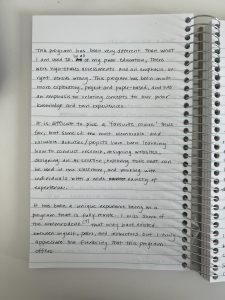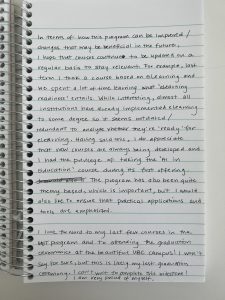


Do you normally write by hand or type? Did you find this task difficult or easy? Explain.
I normally type, so I found this task more challenging than expected.
Firstly, it was difficult to find the appropriate writing technology for this task. I don’t normally keep any paper on my desk, so I had to go searching for this technology and eventually found an old notebook to write in.
After only a few lines of writing, my hand started to cramp up. My muscles are not used to writing by hand and I was shocked at how ‘out of shape’ these muscles were. My students still often write in-person, paper-based exams and I often see them shaking out their hands in discomfort. I can better understand that several of them may not be used to writing by hand, but then are asked to do so on an exam, forcing them to use muscles they are not used to.
The task was to write a reflection of approximately 500 words. I quickly realized how reliant I am on electronic word count tools, and I realized that I have no idea how much writing would constitute 500 words. I ended up counting the number of words in a row and multiplied that by the number of rows to get an approximation.
I am also left-handed and I quickly remembered how annoying coils in a notebook are as they impede my hand placement. Writing near the bottom of the notebook was also difficult as my hand had to hover above the notebook – you may notice that my writing gets a little messier at the bottom of each page.
What did you do when you made a mistake or wanted to change your writing? How did you edit your work? Did your choice of media play a part in how you edited your work?
I made seven mistakes during my hand-written reflection and since I was using a pen, I simply crossed out the unwanted words. I opted not to use white out, mostly because I don’t know if I have any. Another option would have been to start over completely, but given that my hand written work is not being presented formally, it was not worth the effort to edit my work in this way.
My choice of media – pen and paper, limited my options to edit my work. Pen is more permanent than pencil and cannot simply be erased. I opted for pen as I find it clearer to read.
I often mark-up documents using my iPad and Apple Pencil, which merges hand-writing with digital affordances. With these two technologies, I can write ‘by hand’, but am given many more opportunities to edit my work, including erasing and re-arranging text.
What do you feel is the most significant difference between writing by hand and using mechanized forms of writing? Which do you prefer and why?
Writing by hand seems much more effortful, both physically and from a time perspective. It took me approximately 35 minutes to hand-write my reflection (keep in mind that this includes the time to think of what to write as I was writing), but it took me less than 10 minutes to type. The accelerated rate at which typing allows us to record thoughts and convey information seems parallel to the accelerated rates that the printing press enabled as examined by Innis (2007). As typing is more efficient than writing by hand, I wonder if this results in us writing more compared to if we were to hand-write everything.
From a physical perspective, it is more effortful to write by hand and the amount of effort can be influenced by the writing device (e.g. stylus vs. pencil vs. ballpoint pen vs. rollerball pen). The physical effort needed to write by hand can result in variations in the size, shape and overall legibility of our writing (Bolter, 2001). This is not the case with mechanized forms of writing, which has the ability to produce consistent text, in consistent sizes and fonts.
A significant advantage of mechanized (and digitized) forms of writing includes the ability to edit one’s work more easily. I wonder if this causes us to be more critical of our writing and whether we spend more time editing, simply because it’s easier to do.
For work and school-related tasks, I prefer typing as it is much more efficient compared to writing by hand. The formatting and editing abilities are also valuable. However, I find writing by hand more relaxing. I feel more grounded and at peace when writing by hand, perhaps because it is slower so it feels calmer, or perhaps because I associate typing with work and school.
Do any of my peer used mechanized forms of writing for personal hobbies (e.g. diarizing or story writing)? Between typing and writing by hand, which do you find more relaxing and why?
References
Bolter, J. D. (2001). Writing space: Computers, hypertext, and the remediation of print (2nd ed). Lawrence Erlbaum Associates.
Innis, H. (2007). Empire and communications. Dundurn Press.
Hi Shannon,
I originally had forgotten about this comment until Week 8, when we were listening to Dr. Abby Smith Rumsey. I pondered the idea of permanency vs. authenticity vs. preservation and how it relates to handwriting and digitized writing. While it’s true that digitized texts offer advantages in terms of reproducibility and distributed storage, as Lachelle pointed out, Rumsey’s perspective highlights some crucial aspects of permanency that favour handwritten or physical texts.
Rumsey emphasizes that written texts on stable media like archival paper or stone (which isn’t the case in my manual script) can endure for centuries or even millennia without active intervention. This longevity contrasts with digitized texts, which face challenges of technological obsolescence and require ongoing maintenance to remain accessible. Handwritten texts provide a tangible record that is difficult to alter without detection. While digitized texts can employ security measures like encryption and blockchain, they may still be more vulnerable to undetected alterations. Physical texts often preserve contextual information through their material attributes, such as paper type and ink characteristics. This contextual information can be crucial for historical analysis and authentication. While digitized texts may lose some of this physical context, they can potentially capture and preserve more associated metadata.
Hi Shannon!
I might be the exception, but as much as I use computers daily, I routinely fall back on good old pen and paper. Something about the process makes me feel as though the information is flowing directly from the page into my brain—in fact, there is research to suggest that! I take notes at work and when doing course readings. I outline papers I am going to write and make handwritten grocery lists. Perhaps this is all necessary as my memory appears to be failing me, ha!
I love that you compared the time it took you to type versus handwrite. In a study I recently reviewed on notetaking, recall, and understanding, the authors Horbury and Edmonds (2021) noted that the slower process of handwriting could result in a more thoughtful selection of what we choose to write down as opposed to just typing information verbatim. Additionally, Cooke (2012) notes how the digital age removes us from tactile work, which left me with this question: Is there value in slowing down?
Danny Cooke Freelance Filmmaker. (2012, January 26). Upside down, left to right: A letterpress film. [Video]. YouTube.
Horbury, S. R., & Edmonds, C. J. (2021). Taking Class Notes by Hand Compared to Typing: Effects on Children’s Recall and Understanding. Journal of Research in Childhood Education, 35(1), 55 67. https://doi.org/10.1080/02568543.2020.1781307
I know exactly where you are coming from about writing things down, otherwise you’ll forget it! All throughout my undergraduate degree I felt this way and this resulted in me taking notes by hand and studying by hand. It wasn’t until I went through my accounting designation’s training program that I switched over to taking notes on a computer. The switch was ‘necessary’ because there was simply too much to write down. Going through that program “trained” me to better retain information that I typed vs. wrote by hand. Now, similar to you, I still have to ‘write’ things down as my memory also appears to be failing me, but I seem less dependent on the form of writing – both hand-writing and mechanized writing helps.
Hi Shannon
Your comment about your students often writing in-person, paper-based exams and shaking out their hands in discomfort made me think. I understand that many of them might not be used to writing by hand, yet they have to do so during exams, forcing them to use unfamiliar muscles. I wonder how this affects their exam performance. Would their outcomes differ if they were allowed to use a computer? Not just because of the physical discomfort, but if typing is their preferred and more efficient method, could taking the exam on a device lead to better results than handwriting?
Your comment, “I find writing by hand more relaxing. I feel more grounded and at peace when writing by hand, perhaps because it is slower so it feels calmer, or perhaps because I associate typing with work and school,” resonated with me. I couldn’t agree more. Handwriting fosters a more intimate connection with the text, making the writing process more personal and meaningful.
Playing devil’s advocate, while the ease of editing digital text is convenient, it can also lead to over-editing. The constant ability to revise can result in excessive time spent tweaking and adjusting, potentially leading to perfectionism and procrastination (in my case, procrastination). Handwriting, with its more permanent nature, encourages us to think carefully before committing words to paper, leading to more intentional and focused writing. For example, if I need to have a difficult conversation, I am more likely to handwrite a script beforehand rather than type it out. What about you?
It’s a goal of mine to shift from paper-based exams to online exams (in my opinion, this is long overdue!). Paper-based exams don’t capture or mimic the environment that my students will likely work in, in the future (nor to they capture how they likely study either). There are some significant logistical and infrastructure-related barriers to this though. Are you an educator and have you run into similar assessment-related issues?
It’s interesting that you bring up the ‘permanent nature’ of writing and equate handwriting as the more permanent mode. I just commented on Lachelle’s blog (in response to this task – I’ll provide the link down below) and Lachelle brought up the fact that hand-written work on paper is less permanent than computer-written work as computer-written work can be easily reproduced and saved in many places. Hand-written work on the other hand, is often written in one place (e.g. on one piece of paper) and if that paper is destroyed, the work is lost. Does this change your perspective on the ‘permanency’ of handwriting vs. mechanized writing?
Forgot to provide the link…here it is:
https://blogs.ubc.ca/texttech540/category/task4/
I left a comment above to this – sorry it wasn’t linked to this thread.